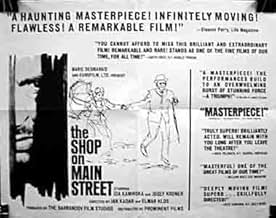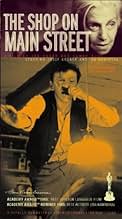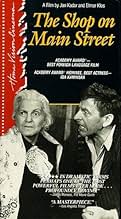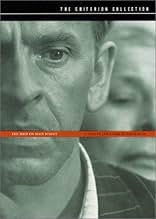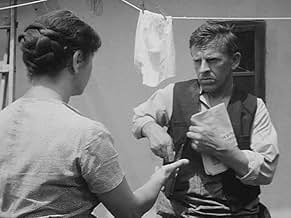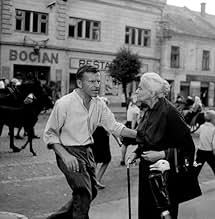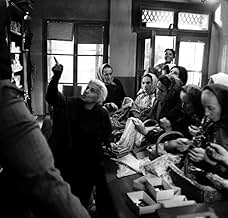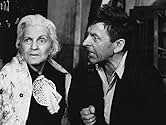CALIFICACIÓN DE IMDb
8.2/10
10 k
TU CALIFICACIÓN
Agrega una trama en tu idiomaA carpenter in the Fascist Slovak State is appointed "Aryan controller" of a Jewish widow's store.A carpenter in the Fascist Slovak State is appointed "Aryan controller" of a Jewish widow's store.A carpenter in the Fascist Slovak State is appointed "Aryan controller" of a Jewish widow's store.
- Dirección
- Guionistas
- Elenco
- Ganó 1 premio Óscar
- 6 premios ganados y 4 nominaciones en total
Ida Kaminska
- Rozalia Lautmannová
- (as Ida Kaminská)
Frantisek Zvarík
- Markus Kolkocký
- (as Frantisek Zvarík)
Ladislav Farkas
- Young Man
- (sin créditos)
Luise Grossová
- Eliasová
- (sin créditos)
Juraj Herz
- Jewish Man
- (sin créditos)
Opiniones destacadas
Words can hardly do justice to this gem. Understated cinematic grandeur, ultimate moral subtlety, acting without pair in the annals of movie history, philosophical and ethical depth without sententiousness . . . should I invent new superlatives to describe this indescribably touching movie?
Yes, the movie has to do with the tragedy of Jewish people in the poisoned and poisonous Europe of the WWII period, but the emotional implications go much farther than that. They address human condition in general. It is one of those egregiously few movies which make a "philosopher" out of each of us. . . even if for a minute only. . . even if we only philosophize with our unstoppable tears. I am not one to weep easily at movies, but I defy you to watch this fabulous work of cinema without being touched to the deepest fiber of your soul.
Yes, it is that good. One of the very few movies which are better than GREAT MUSIC. Watch it - preferably on the Criterion DVD, the VHS edition leaves a lot to be desired. Unless you are an unfeeling freak, no offense intended, it is very unlikely that you will ever regret it.
Yes, the movie has to do with the tragedy of Jewish people in the poisoned and poisonous Europe of the WWII period, but the emotional implications go much farther than that. They address human condition in general. It is one of those egregiously few movies which make a "philosopher" out of each of us. . . even if for a minute only. . . even if we only philosophize with our unstoppable tears. I am not one to weep easily at movies, but I defy you to watch this fabulous work of cinema without being touched to the deepest fiber of your soul.
Yes, it is that good. One of the very few movies which are better than GREAT MUSIC. Watch it - preferably on the Criterion DVD, the VHS edition leaves a lot to be desired. Unless you are an unfeeling freak, no offense intended, it is very unlikely that you will ever regret it.
Objective aethetics can sometimes require background information in order to properly judge a piece of art. In the case of this film, it is essential to realize that the film was made under heavy communist censorship. Thus we have plenty of anti-fascist rhetoric as well as the heroic rebel character who abound in Marxist cinema. Yet behind this facade is a devastating critique of the ideology of terror which is the foundation of not only fascism, but the communism of 1960's Eastern Europe.
There's a whole tradition of political film forced to obscure themes enough to slide them past superficial censors and into the minds of a sometimes discerning audience. It can be done by simply universalizing the themes and parallelling the setting with something the audience could recognize. But Chaplin had explored a different method with The Great Dictator, by finding the similarities between two seemingly opposite figures. Through his critique of Hitler, he took on American pomposity and brutality. It is a particularly effective method as it allows the target no way out, turning its own accusations against itself.
Much has been said about the comedy and tragedy's coexistence in this film, and it is indeed an important facet. The simple reason being that life is both funny and tragic, thus to universalize the themes so that any person can be in the Brtko's place, it is imperative to represent both spheres of life.
But the theme is not limited to a broad contemplation on life in the universal sense. There is a much more devestating critique of all totalitarian ideologies. Brtko begins with a simple and, one could argue, natural sense of survival. He is pushed into greed by his wife, and is then pushed into desperation by the his state-sanctioned duty. He finally arrives into a complete state of terror caused by the irrationality of the events around him, and heightened by his relationship with Mrs. Lautmann. Of course, this kind of degradation could happen just as easily under a communist regime as in the days of the Nazis, and this was what the censors missed and the Academy Awards loved.
Few films have the social significance of this one. Not only for its powerful message, but the fact that it is a glimpse into a world we know little about.
5 out of 5 - Essential
There's a whole tradition of political film forced to obscure themes enough to slide them past superficial censors and into the minds of a sometimes discerning audience. It can be done by simply universalizing the themes and parallelling the setting with something the audience could recognize. But Chaplin had explored a different method with The Great Dictator, by finding the similarities between two seemingly opposite figures. Through his critique of Hitler, he took on American pomposity and brutality. It is a particularly effective method as it allows the target no way out, turning its own accusations against itself.
Much has been said about the comedy and tragedy's coexistence in this film, and it is indeed an important facet. The simple reason being that life is both funny and tragic, thus to universalize the themes so that any person can be in the Brtko's place, it is imperative to represent both spheres of life.
But the theme is not limited to a broad contemplation on life in the universal sense. There is a much more devestating critique of all totalitarian ideologies. Brtko begins with a simple and, one could argue, natural sense of survival. He is pushed into greed by his wife, and is then pushed into desperation by the his state-sanctioned duty. He finally arrives into a complete state of terror caused by the irrationality of the events around him, and heightened by his relationship with Mrs. Lautmann. Of course, this kind of degradation could happen just as easily under a communist regime as in the days of the Nazis, and this was what the censors missed and the Academy Awards loved.
Few films have the social significance of this one. Not only for its powerful message, but the fact that it is a glimpse into a world we know little about.
5 out of 5 - Essential
A fine movie showing just how easy it is for people to become oppressors. Tono is just an average Joe, keeping his nose clean, until he is co-opted into participating in the Nazi regime by his well-placed brother-in-law. Along the way Tono's wife shows the warping power of greed. The seeds of a fatal moral dilemma are set as Tono becomes the Aryan "controller" of a Jewish business run by a befuddled widow. Ultimately the horror becomes clear as the Jews are rounded up and the widow - played brilliantly - briefly comes to her senses and realizes she is the victim of a "pogrom." All the relationships and characters in the movie are finely drawn and well acted, and the production values were excellent.
The version I reviewed was subtitled in English, and unfortunately some of the subtitles were difficult to read.
The version I reviewed was subtitled in English, and unfortunately some of the subtitles were difficult to read.
This movie is one of my all-time favorites. It depicts a lazy, self-interested "everyman" caught up in a personal struggle of good and evil. The directors/writers question the moral responsibility of genocide, as smalltown Czechs under Nazi domination respond to their Jewish neighbors. Jews are no longer allowed to own shops, so their businesses' control and ultimate ownership is turned over to Christians -- namely, Nazi sympathizers. One such Christian, brother-in-law of a high-ranking official, is given a button shop, owned by a deaf, elderly Jewish woman, who is not even aware that there is a war going on. Due to her deafness, she has the innocence of a child. The Christian overseer finds that the shop makes no money whatsover, but also learns that the Jewish community supports the old woman and will pay him a salary to watch over her. What develops is a platonic love story between the two, hilariously funny due to the old woman's inability to comprehend the impending doom around her, and her assistant's struggle to shield her from harm while concerned with self-preservation. The movie works on numerous levels -- as a love story, including dreamlike fantasy elements of a bygone world where Nazi horrors don't exist; and as a tale of ultimate moral responsibility. It is a story of basically good people, who say nothing, see nothing, hear nothing, and do nothing when genocide threatens their neighbors, and who thus enable genocide to occur. The brilliant combination of hysterically funny scenes set against a background of impending mass murder brings this film to a life that is lacking in most humorless holocaust-oriented films. The laughter through tears produces an ultimate impact that is emotionally devastating. This film justly received an Oscar for Best Foreign Film when it was released. It was produced during a brief high point of the Czech film industry, prior to Russia's reconquering of the country and squelching any artistic freedom. All the performers are exceptional, particularly the two leads. (After the Russian takeover, actress Ida Kaminski emigrated to New York and attempted to revive the Yiddish Theatre.)
I'll skip over the story and the themes. Other commenters have said wonderful things about that.
Let's talk visuals.
I just have to say I was blown away by almost every single shot of the movie. The black and white color looks gorgeous, and the indoor shots have lots of shadows and texture. The outdoor shots seem overexposed, brilliant, artificial and almost unbearable. The criterion version just looks superlative.
Watch the dinner scene at the start where the man's brother in law is getting drunk with Tony. They are yelling, and having a time, and the camera dives/sweeps/rapidly turns around and falls. It conveys the dizzying nature of the conversation. The outdoor scenes in the first half of the movie have lots of bustle and activity, with lots of turns and shifts of perspective. People will remember the historical themes, but please don't overlook the amazing cinematography (which rightfully doesn't call attention to itself but enhances the emotional impact of every scene). In one scene (where Person X hits Person Y), camera conveys the claustrophobic, almost paranoiac perspective of Person X and sets the rest of the action up. We just knew what was going to happen next here.
The dream sequences/surreal effects were modest and didn't seem too fantastic; they were small enough for a small man overtaken with fear.
Let's talk visuals.
I just have to say I was blown away by almost every single shot of the movie. The black and white color looks gorgeous, and the indoor shots have lots of shadows and texture. The outdoor shots seem overexposed, brilliant, artificial and almost unbearable. The criterion version just looks superlative.
Watch the dinner scene at the start where the man's brother in law is getting drunk with Tony. They are yelling, and having a time, and the camera dives/sweeps/rapidly turns around and falls. It conveys the dizzying nature of the conversation. The outdoor scenes in the first half of the movie have lots of bustle and activity, with lots of turns and shifts of perspective. People will remember the historical themes, but please don't overlook the amazing cinematography (which rightfully doesn't call attention to itself but enhances the emotional impact of every scene). In one scene (where Person X hits Person Y), camera conveys the claustrophobic, almost paranoiac perspective of Person X and sets the rest of the action up. We just knew what was going to happen next here.
The dream sequences/surreal effects were modest and didn't seem too fantastic; they were small enough for a small man overtaken with fear.
¿Sabías que…?
- TriviaThis movie was shot exclusively in the small Slovak city of Sabinov.
- ErroresSet in 1942, a German troop train moves through the town. The train is carrying Soviet cold-war era trucks and anti aircraft guns that didn't exist until the 1950s. It's understandable for them to make this substitution since any authentic German equipment would have been scrapped long before.
- Citas
Jozef Katz: I don't understand anything any more. But I know one thing. When the law persecutes the innocent, that's the end of it. And those who make the law, too.
- ConexionesEdited into CzechMate: In Search of Jirí Menzel (2018)
- Bandas sonorasÉn vagyok a falu rossza egyedül
(uncredited)
Written by Lajos Békésy, Imre Garsi and László Patak
Performed by Jozef Kroner, Frantisek Zvarík, Hana Slivková and Elena Zvaríková
Selecciones populares
Inicia sesión para calificar y agrega a la lista de videos para obtener recomendaciones personalizadas
- How long is The Shop on Main Street?Con tecnología de Alexa
Detalles
- Tiempo de ejecución2 horas 8 minutos
- Color
- Mezcla de sonido
- Relación de aspecto
- 1.37 : 1
Contribuir a esta página
Sugiere una edición o agrega el contenido que falta

Principales brechas de datos
By what name was La tienda en la calle mayor (1965) officially released in India in English?
Responda

